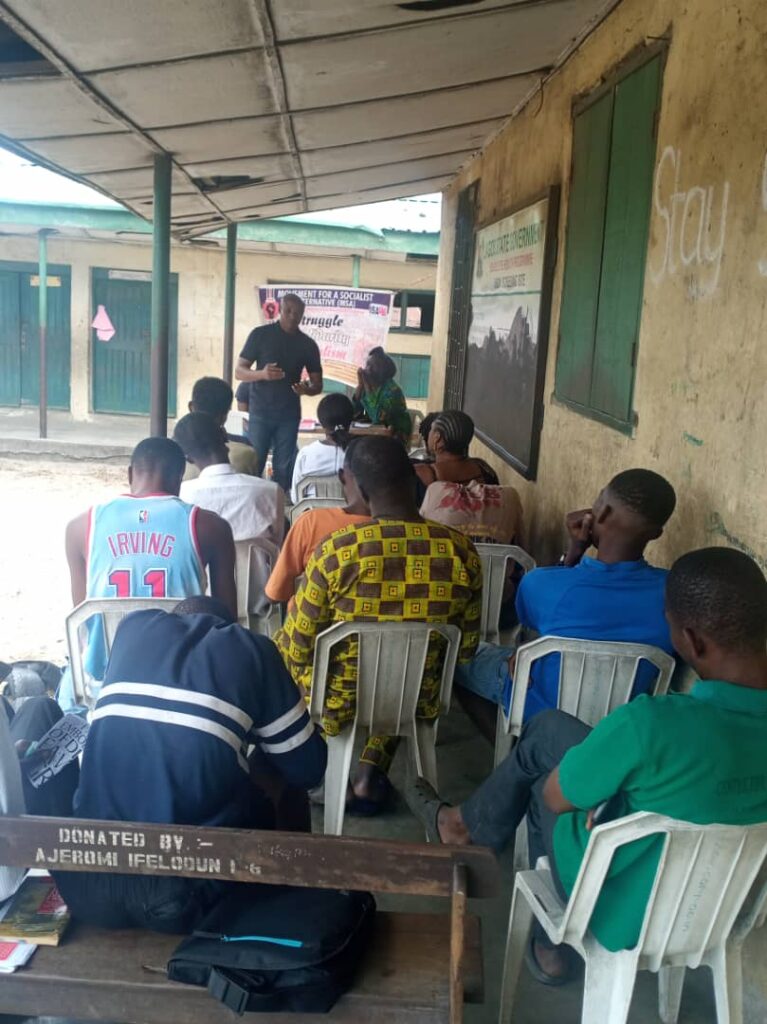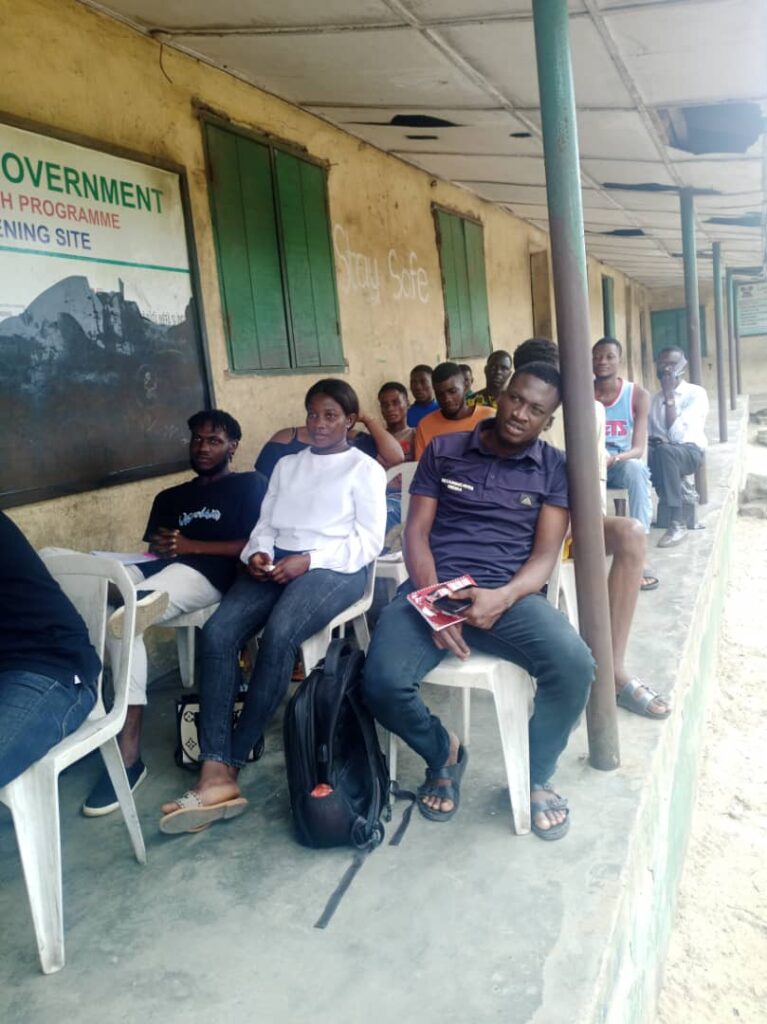Independence-day Public Symposium: Participants Lament High Cost of Living under the Buhari Government.

AJEGUNLE-LAGOS
Join MSA in its campaign for a Socialist Government of Workers and Poor Farmers.
By Bestman Michael
October 1, 2022, Nigeria marks its 62nd year as an independent nation. As predicted, the festivity around such an independence celebration was low. There was barely any citizen in the usual carnival of colours: green and white.
If anything, on October 20, 2020, that colour was stained by the blood of innocent citizens murdered by the government for standing up for justice and fighting against the onslaught of police brutality in the country — a year that would become a volta for mass mobilisation and political participation.
Thus, within these 62 years of degenerating economic crises, the Movement of Socialist Alternative MSA (Ajegunle branch) had a program in the community to discuss “Nigeria @ 62: 2023 General Elections, any hope for the masses?” The programme was organised on the 3rd of October 2022 with an attendance of young people specifically.
The lead speaker, Emeka Bosah, a community activist, started with the background of “mental laziness” that had enveloped a majority of Nigerians. This, he posits, shows that most Nigerians have barely gone beyond the question of survival to think or reason together on how to move the country forward.
For him, there is a thick growing illusion around the Peter Obi candidacy driven by religious and ethnic/tribal sentiments. However, he pointed to the series of crises that have plagued the country since independence such as mismanagement and corruption under the IMF/World Bank-controlled economy.
He spoke about the March 15, 2014, stampede that killed at least 30 Nigerian job seekers during a recruitment process by the Nigerian immigration service. He emphasized about epilepsy in power supply and the high cost of power; the ASUU Strike and collapse of public education; and how the programs of the major presidential candidates — Peter Obi, inclusively — are geared towards the neo-liberal policies of capitalism: privatisation, commercialisation of the commanding heights of the economy.
Adding to the above template, Aj Dagga Tolar started by posing two major questions when one examines the such topic of discourse: first, the emergence of Peter Obi & Labour Party? And, second, what is the problem in Nigeria?
While these questions are vital, he began his lead-off from both a historical, political, and economic analysis of the country. Stating how statements of Lord Lugard praised the ruling Northern elite for their cooperation during the colonial period.
This demonstration shows how the ruling class are comfortable with a system that sustains them in varying form and why independence was given to the North as he made reference to a YouTube video where Harold Smith was interviewed in Fatherland.
However, he illustrates that the current trend of crises by the Buhari regime may, hypothetically speaking, lead to a coup or an indecisive June 12, 1993 general election that the Babangida regime annulled. If any of this happens, there would be a course for movement from the Nigerian masses, who in seeking genuine change are rallying around the Peter Obi candidacy.
The lead-off expressed the cost of living and the challenges the working masses are facing. It’s also link the background of Nigeria economic sliding with the Ukraine-Russia war. It’s added that those who feel it does not affect neo-colonial countries will be making a mistake.
This is because the crises of capitalism and imperialism are global. Also, the speaker made reference to the death of Queen Elizabeth and how she was instrumental in the independence of Nigeria and ever since her 70 years of rule got a lot of people questioning the role of the monarchs or traditional rulers in the 21st century.
On the Peter Obi/Labour Party question, Aj Dagga Tolar says that while we cannot entirely dismiss the wave of youths and ordinary people running around him. It is clear that what Peter Obi represents is not different from what Atiku or Tinubu represent.
He drew some vital inferences from Peter Obi’s disposition as a ‘stingy’ already made billionaire, who stated he is richer than the American President — such a person as many would feel he may not embezzle public funds — is here to sustain the growth of big business and privatisation.
For him, the only way forward for Nigeria is a working class revolution with a party that represents the interest of the working class. Labour leaders, who could have played that role with the Labour Party, have been sold into the ideals of the capitalist ruling class.
It is why Peter Obi could even consider being a candidate for Labour Party. However, he spoke at learnt about why socialism remains the only system that will guarantee the working class to democratically manage and control the means of production.

That, when the idea of socialism is raised, a supposed means of mass liberation, a large chunk of people are made to believe “it is a foreign idea”. Yet, the same ruling elite or idea doesn’t consider the dominant Christian or Muslim religions or the fleets of cars as foreign.
In summary: the lead-off urged persons who attended the symposium to join the Movement For A Socialist Alternative. It’s emphasis is to dare to struggle is the way out for Nigeria and the world under capitalism.
In the contributions: the persons (Lateef, Yusuf and Davy), who spoke in perspective emphasize intensively on privatisation, Nigeria debt profile, the rate of suicide, depression, and the psychological trauma breaking people down, especially young people making the largest section of Nigeria population.
Added to it were classic from lessons of the 1917 Russian Revolution, the 1789 French Revolution, and the Industrial Revolution, which according to one of the speakers paved the way for science and technology, advancing capitalism to developed through cheap labour, slavery, and colonialism.
The general conclusions of the lead speakers and the persons who contributed is that, Nigeria is sinking. And building a political alternative is required to solve the contradictions rooted in capitalism.
A resident asked a question about who will spearhead the change people are seeking. Attempted answers were put forward to reemphasize that rebuilding a new society rest on the shoulder of the working people.
The symposium that lasted for two hours and thirty minutes. And, it’s have in attendance 18 persons, which includes MSA members. Two papers were sold. A fighting fund of N2000 ($3) was raised as cash.
The meeting started and ended with solidarity songs. And Bestman Michael led it while Tunde Yusuf moderated the symposium.
